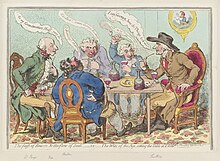Witis a form of intelligenthumour—the ability to say or write things that are clever and typically funny.[1]Someonewittyis a person who is skilled at making clever and funny remarks.[1][2]Forms of wit include thequip,repartee,andwisecrack.

—James Gillray(1797)
Forms
editAs in the wit ofDorothy Parker's set, theAlgonquin Round Table,witty remarks may be intentionally cruel (as also in manyepigrams), and perhaps moreingeniousthan funny.
Aquipis an observation or saying that has some wit but perhaps descends intosarcasm,or otherwise is short of a point. Awitticismalso suggests the diminutive.
Reparteeis the wit of the quick answer and capping comment: the snappy comeback and neat retort.
Metaphysical poetryas a style was prevalent in the time of English playwrightWilliam Shakespeare,who admonished pretension with the phrase "Better a witty fool than a foolish wit".[3]It may combineword playwith conceptual thinking, as a kind of verbal display requiring attention, without intending to be laugh-out-loud funny. Indeed wit in verse can be a thin disguise for more poignant feelings. English poetJohn Donneis the representative of this style.[4]
Other uses
editMore generally, one'switsare one's intellectual powers of all types.Native wit—meaning the wits with which one is born—is closely synonymous withcommon sense.Tolive by one's witsis to be anopportunist,but not always of the scrupulous kind.To have one's wits about oneis to be alert and capable of quickreasoning.To be at the end of one's wits ("I'm at wits' end") is to be immenselyfrustrated.[citation needed]
See also
editReferences
edit- ^ab"wit".Merriam-Webster.Retrieved2012-05-27.
- ^"wit".Oxford Dictionaries.Archived fromthe originalon July 19, 2012.Retrieved29 May2015.
- ^Salingar, Leo (1976).Shakespeare and the Traditions of Comedy.Cambridge University Press. pp.245–246.ISBN978-0-521-29113-2.
- ^Daley, Koos (1990).The Triple Fool: A Critical Evaluation of Constantijn Huygens' Translations of John Donne.De Graaf. p. 58.ISBN978-90-6004-405-6.
Bibliography
edit- Jefferson, D. W. (1951). "Tristram Shandyand the Tradition of Learned Wit ".Essays in Criticism.Vol. 1. pp. 225–49.